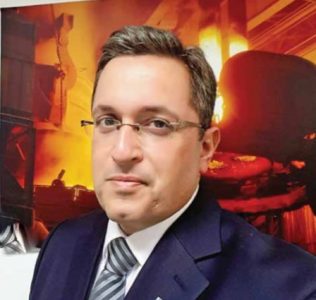While Serbia’s alignment with the EU’s principal directives on waste management is good, improvements in implementation are needed

Inos Balkan is one of the leading metal recycling companies in Serbia, processing and trading ferrous and non-ferrous scrap metals, since 1951. It also offers a wide range of integrated waste management services.
At the beginning of 2018 you have said that this year was a milestone year for Inos Balkan. If you look back today, what did you achieve and where are you heading today?
— Last year was indeed a milestone year for Inos Balkan. After resolving the issue with the non-tariff burdens on the export of secondary raw material, we were able to focus again on the implementation of our strategic planning for enhancing our commercial activities quantity wise and geographically wise and for improving our logistics efficiency. In addition we are preparing a set of investments in the field of waste processing and thus we have already increased our capital share by € 5,9 mil.
Would you say that the legislation governing the environmental protection is Serbia is going into right direction?
— Chapter 27 of EU integration process will create new business opportunities for our sector. We do expect that the application of the polluter pays principle, will significantly alter the competitive landscape on our sector and particularly in the management of the so called special streams of waste, like End of Life Vehicles (ELVs) and Waste of Electric and Electronic Equipment (WEEE). The European acquis comprises values and principles that will allow the creation of a levelled playfield and subsequently free trade conditions will attract the necessary investments. In addition, water and air quality, municipality waste management, industrial pollution control and risk management, and noise prevention will be addressed and will potentially change the operating practices in the recycling sector as well as in the sector of industrial metallurgy.
In comparison to other markets you are operating in, where Serbia stands in exercising its capacities when it comes to waste recycling?
— There is significant potential for waste recycling, as Serbia recycles less than 3 % of its total waste (vs. around 40 % in the EU). While Serbia’s alignment with the EU’s principal directives on waste management is good, improvements in implementation are needed, with operation and performance of recycling firms negatively affected by unpredictable public financing. In addition relative Chapter 27 on the EU accession process is not expected to be opened before 2020 and is expected to be the last to be closed. Among the Balkan countries, the worst results in 2017 were achieved by Bosnia and Herzegovina, which recycled no municipal waste, while Romania 13%, Croatia 21%, Cyprus 17%, Greece 17% and Bulgaria 32%. Slovenia took the first place with 58% of municipal waste recycled.
How much the market has changed in the last five years? Did reforms in the economy bring higher environmental protection standards and capacities?
— The decision of the Serbian government to establish an independent Ministry of Environmental protection was a key factor. All the stakeholders (public sector institutions, private sector organizations, as well as citizens of Serbia) are now in position to identify the size of the problem when it comes to environmental protection in general and waste management in particular. The size of the necessary investments is enormous and the ministry of Environmental protection of Serbia has undertaken the mission to provide with the adequate environmental policy plan.The reforms that took place in the Economy of Serbia the last 5 years, are preparing the business environment that will host the necessary investments in the field of environmental management, while the opening of Chapter 27 of the EU integration process will further enhance the environmental standards.
Recycling is often connected with intensive manual work but you employee highly qualified staff too. In today’s era of digital solutions, what kind of skills are you looking for?
— Secondary raw material sector is driven by free market conditions, metal prices fluctuation and by a changing legal framework that we have to comply with. This is the reason why we employee in our company a team of people highly qualified in finance, engineering, environmental management and sales. A team of people that allow us the face all day to day challenges as well as to adequate plan our future steps. Further to the technical skills we are paying special attention on the soft skills of our employees. We are enthusiastic with what we do and we want our employees to share the same enthusiasm. Do not forget that our core corporate principles are responsibility, integrity, efficiency, innovation and professionalism.
Apart from digitalisation, what are the factors which will contribute the most to the scope of your work in Serbia?
— When accessing the business environment in Serbia, we do identify the following factors as key contributing at our scope: Political and social stability, Macro economically sustainable and inclusive economic growth, Banking sector performance, Measures in order to reverse brain drain and aging of the population in Serbia, Privatization / restructuring of SOE (State owned enterprises), Chapter 27 of the EU integration process.